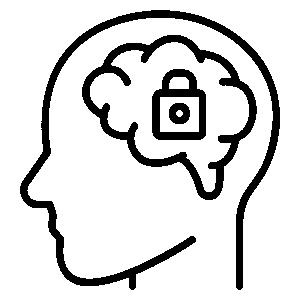AVYIA’s recommended therapy for mental health illnesses.
IV KETAMINE
 Reduce Cravings
Reduce Cravings Anti-inflammatory
Anti-inflammatoryCost
Free initial consultation, intake, history and physical.
$2,994 for a course of 6 treatment sessions.
$449 for each additional booster session after a standard course.
Onset of Action | Time to Take Effect:
Seconds to a minute (dissociative effects can begin within ~10–30 sec).
Bioavailability
100%
Administration Time
Infused ~40 min at 0.5 mg/kg is the most common protocol.
Monitoring Time:
~1–2 hours of observation (until vitals and sensorium normalize)
Dosage
Dose Equivalence – .5mg/kg IV in 70 kg adult: 35mg
Dose Equivalence – 1mg/kg IV in 70 kg adult: 70mg

Overview
Intravenous (IV) ketamine is the gold-standard of ketamine therapies for treating mental health disorders, OCD, and migraines. With AVYIA’s seasoned healthcare professionals, you can now undergo these treatments in the privacy and comfort of your home. For enhanced benefits, consider integrating ketamine-assisted therapy into your infusion sessions. This therapy involves a structured session overseen by a certified therapist. Research suggests that a series of six IV treatments spread over three weeks can lead to significant improvements, with some patients achieving total remission. Incorporating ketamine-assisted therapy can further optimize these outcomes.
The treatment’s dissociative and psychedelic characteristics are believed to encourage neuroplasticity, aiding in the restoration of compromised brain connections. A wealth of patient testimonials supports the efficacy of this approach. While the initial series of treatments can be transformative, occasional follow-up sessions might be required. Nonetheless, the intravenous method stands out as the most rapid and potent means to achieve full recovery from mental health challenges.
The dissociative and psychedelic properties are theorized to promote neuroplasticity, or the reconnecting of damaged brain pathways. Numerous anecdotal patient reports attest to the effectiveness of this treatment modality, but the body of science behind ketamine is also robust and impressive. Periodic booster sessions may be needed after the initial course of treatment; however, the intravenous route appears to be the fastest and most powerful method in achieving complete remission of one’s mental health disorders.
Benefits of Ketamine
Ketamine is a member of the class of cyclohexanones in which one of the hydrogens at position 2 is substituted by a 2-chlorophenyl group, while the other is substituted by a methylamino group. Ketamine was originally developed as an anesthetic, but has gained interest in recent years for its success in treating various mental health disorders. Research is ongoing, but here’s what we know about ketamine’s effects and abilities to treat mental health disorders:
What does it treat?
- Anxiety or Generalized Anxiety Disorder
- Treatment Resistant Depression
- Depressive Disorder
- Post-Traumatic Stress Disorder
- Bipolar Affective Disorder
- Bipolar Depression
- Post-Partum Depression
- Obsessive Compulsive Disorder
- Suicidal Thoughts or Ideation
- Migraine and Neurological Pains
- Substance Abuse Disorder
Frequently asked questions
Does Microdosing Ketamine Work for Migraines?
Yes. Microdosing has been used to treat migraines as well as chronic pain. Microdosing on a daily basis might be a viable option for individuals experiencing refractory chronic migraines, for whom traditional painkillers and preventive medications are usually ineffective. Those suffering from headaches on a daily or near-daily basis may find significant benefits from microdosing, as it offers patients greater control in managing their own dosing regimen to better control their symptoms.
What are the different types of migraines exactly?
There are many types of migraines and headache types: Migraine without aura, migraine with aura, migraine without head pain, hemiplegic migraine, retinal migraine, chronic migraine, abdominal migraine, ice pick headache, cluster headache, cervicogenic headache, thunder-clap head ache, tension headaches, and many other headaches as a result of other ailments.
Can I work after a Ketamine infusion?
Immediately after ketamine treatment, it is common to feel a little tipsy, uneasy, or nauseous. Also feeling exhausted is not an uncommon symptom either. Although some individuals are able to resume their work routine 1-2 hours after treatment, we recommend taking the remainder of the day off following your initial visit to assess how you feel. You should not drive immediately after an IV or intranasal infusion as you are under the influence and likely impaired.
Patients microdosing ketamine typically do not have any impairment from their ketamine, but should still exercise good judgement with respect to driving and operating dangerous tools or equipment.
Is Ketamine treatment legal?
Yes, “off-label” use of ketamine for treating migraines and other disorders is perfectly legal. In fact, 1/5 to 1/4 of all prescription medications are prescribed off-label. The term off-label use refers to the use of a medication for a purpose other than what it was originally approved for by the regulatory authorities. Ketamine was initially approved by the U.S. Food and Drug Administration (FDA) for use as an anesthetic and analgesic medication.
Healthcare providers are legally allowed to prescribe medications, including ketamine, for off-label uses if they believe it is medically appropriate and in the best interest of the patient. Off-label use is common in medicine, and it allows healthcare professionals to explore alternative treatments for various conditions, especially when traditional treatments have been ineffective or unavailable.
Are there any potential complications?
AVYIA’s low dose ketamine is well-tolerated and safe when used under the supervision of a medical provider.
Side effects are generally mild and well tolerated. Symptoms may vary from patient to patient, but common side effects are slight elevations in blood pressure and nausea. Nausea can be easily treated with antiemetics or anti-nausea medications on the spot.
Psychedelic experiences and dissociative effects may occur in the doses we give for IV and intranasal treatments. This is also known an out-of-body experience, or going on “a trip.” After completion of a treatment, some patients have reported false epiphanies, such as “knowing the meaning of life.”
All these effects are typically short lasting once the treatment is over. Patient’s are back to their baseline the next day typically, but we still recommend exercising caution. Patients should not drive while under the influence of ketamine, nor should they make rash decisions on false epiphanies. Finally, AVYIA requests patients have a responsible adult present to monitor patients after the healthcare providers finish their monitoring efforts.
Is everyone eligible for Ketamine treatments?
No. Ketamine is not for everyone. Patients with schizophrenia, schizo-affective disorder, mania, hypomania, recent psychosis, or psychotic episodes, should not be on ketamine therapy. Ketamine therapy for mental health treatment is generally contraindicated patients with severe heart diseases, uncontrolled hypertension, increased intracranial pressure, recent stroke, interstitial cystitis or severe bladder disease.
It is crucial for AVYIA to conduct a through medical evaluation and review the patient’s medical conditions before recommending ketamine treatment.
How can I get started with ketamine treatment?
If you are interested in ketamine therapy just simply click on the “free consultation” button, then provide your contact information for us to give you a call. We’re happy to answer any questions or discuss a treatment plan. No pressure or commitments at all.
When you’re ready to start treatment, schedule an initial telehealth appointment by clicking the “appointment” button on the top, or give us a call. We’ll start by setting you up with one of our clinicians.


